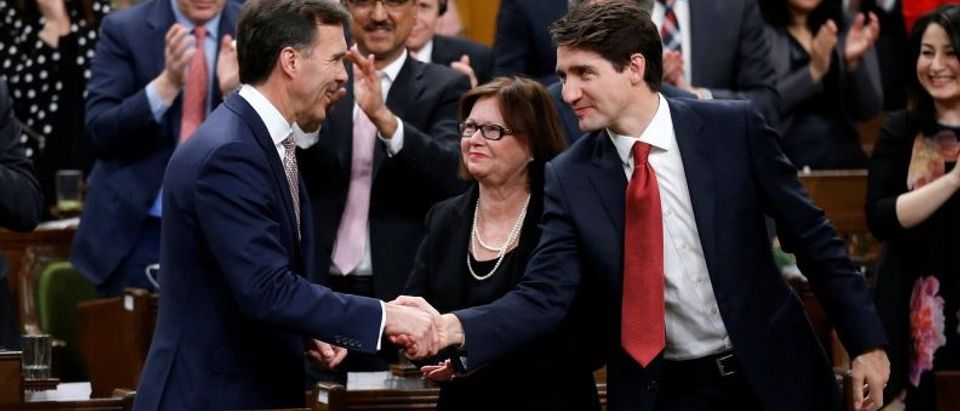Canada’s Liberal government continues to insist that it attracts the same type of voters as those who elected President Donald Trump.
Finance Minister Bill Morneau, who was roundly criticized from both the left and right over his March federal budget, said Friday that middle class “anxiety” was responsible for both Trump and Trudeau winning their respective elections. Morneau has just returned from a U.S. trip where he was selling the benefits of continued free trade between Canada and the U.S.
“As we go out to the United States, we reinforce the importance of jobs — that’s a common factor that we share with Americans,” Morneau said.
“Having secure, well-paying jobs over the long term is the surest antidote to anxiety about the future.”
The charm assault on the Trump administration is nothing new for Trudeau’s cabinet — where a special committee has been formed to exclusively deal with American concerns about NAFTA.
Morneau has been focusing his efforts on Indiana Governor Eric Holcomb — the successor to Vice President Mike Pence. Morneau says he and Pence also have much in common and the two have chatted about the economic conditions that the two countries share.
“I found that the relationship with Vice President Pence started off on a very strong footing when we were in the White House,” Morneau said.
“He’s very interested and because of his background in a state like Indiana, which has such a strong relationship with Canada. He already has a good starting point in understanding how important the relationship is.”
His office sent out a release this week saying that Canada is Indiana’s top customer. It also said nearly 190,000 jobs in the state are directly connected to trade and investment with Canada.
The Canadian finance minister made the same speech about economic connectivity earlier this week at a World Economic Forum meeting in New York City and again when he spoke at last month’s G20 meeting in Germany.
“We talked about the challenges that fueled our election in Canada and the challenges that fueled the new administration in the United States — and the very real sense that we both need to strengthen the middle class in our countries,” he said.
According to Christopher Sands, a political science professor at the Center for Canadian Studies at Johns Hopkins University, it’s part of the Trudeau government’s challenge of trying to convince the Trump administration that a left-of-center Canadian administration that is fixated on climate change and legal marijuana has a lot in common with Trump voters.
“Politically, it’s smart. Don’t treat Trump as crazy or impossible, but try to find a way to seem as normal and as comfortable with him as possible and he’ll be the same with you,” Sands told the Globe and Mail.
Sands doesn’t see the Trump and Trudeau voters as similar as Canada did not experience the “populist, nationalist, frustration with the establishment” that drove the Trump movement.
Colin Robertson, a retired Canadian diplomat who spent much of his career in the U.S. says Morneau is looking for “convergent points” with the U.S. and “that’s probably wise” as Canada has always had to fight to stay relevant with U.S. decision makers.
Robertson says Canada needs to keep talking about mutual economic interests and avoid areas like immigration and the environment where there are distinctive differences between the two countries.


